Reviews
John Carpenter
UK/USA, 1981
Credits
Review by Budd Wilkins
Posted on 11 August 2013
Source MGM Blu-ray
Categories Favorites: The Apocalypse
Although it didn’t see the light of day until Ronald Reagan’s triumphalist Morning in America had dawned over the land, Escape from New York was initially conceived in the disenchanted aftershock of the Watergate scandal, when confidence in the nation’s structures of power as embodied in that glorified used car salesman, “Tricky Dick” Nixon, was at an all-time low. The sense of disaffection with our Commander-in-Chief experienced by creative types like writer-director John Carpenter, who had been opposed to the war in Vietnam as well as Nixon’s efforts to undermine the counterculture with programs like COINTELPRO, finds its perfect expression in a line delivered by Escape from New York’s consummate antihero Snake Plissken: “I don’t give a fuck about your war…or your president.”
Given the film’s conceptual proximity to the Watergate era, it’s not much of a stretch to note certain parallels between its vision of a crypto-fascist American police state and the writings of Philip K. Dick, who was at the time crafting mind-altering and deliriously paranoid novels along the lines of Flow My Tears, the Policeman Said. In that book, a militarized confluence of the police and National Guard forces radicalized students to subsist in subterranean “rabbit warrens,” all that remains of the nation’s universities. In Carpenter’s film, Manhattan has been walled off and converted into a maximum security prison. As the icy tones of the narrator inform us, “The United States Police Force, like an army, is encamped around the island. There are no guards inside the prison, only prisoners and the worlds they have made. The rules are simple: Once you go in, you don’t come out.”
Air Force One is hijacked and crashed into downtown Manhattan, an alleged revolutionary act that evokes a complex nexus of associations. The diatribe delivered by the stewardess-cum-terrorist hearkens back to rhetoric used by the SLA or the PLO, a full-on “anti-imperialist” screed intended to stick it to the “fascist police state.” On the other hand, the act itself, in conjunction with Plissken’s subsequent landing atop the World Trade Center, might strike contemporary viewers as some uncanny anticipation of the 9/11 attacks. Escape from New York stands as a Janus-headed rumination on terrorism and its causes, rooted as it seems to be in criminality but also in deprivation and isolation. Enter war hero turned bank robber Snake Plissken, all John Wayne swagger, Eastwood rasp, and sporting a piratical eye patch to boot. Antithetical to Wayne’s clear-cut heroic persona, far darker than Clint’s Man with No Name, Snake exudes apathy toward larger sociopolitical realities, as mentioned above, motivated purely by an instinct for self-preservation.
Snake Plissken’s journey through the heart of New York’s darkness hinges on a series of encounters with denizens whose attributes exaggerate and/or parody aspects of the urban nightmare portrayed in films like Death Wish, which was cited by John Carpenter as an influence on the look (if not the philosophical outlook) of Escape from New York. The “crazies” that Snake runs into outside the ironically apposite Chock Full o’ Nuts store are an animalistic threat akin to a pack of half-starved rats. There seems to be an oblique reference here to George Romero’s film The Crazies, an association that’s only strengthened when you recall that the Duke’s right hand man is named Romero. In Romero’s film, ordinary citizens are turned into raving killers by a toxic leak caused through governmental negligence.
Brain’s conversion of the New York Public Library into his own private sanctuary speaks volumes about the collapse of public institutions into fiefdoms ruled over by the strongest or smartest members of the social order. The Duke of New York, for example, is decked out in military garb, including a Napoleonic bicorn hat. As with many of these tales of future shock, a lot can be gleaned about attitudes toward social philosophy from their depictions of mass culture. In Escape from New York, public entertainment has been reduced to either parodic spectacle, as in the gender-bending “Everybody’s Coming to New York” chorus line revue, or brutal blood sport like the gladiatorial combat with nail-studded bats Snake Plissken is “recruited” into.
Carpenter and co-writer Nick Castle have delineated an utterly convincing dystopian space, a neo-feudalistic world lit only by torch fire. But does Escape from New York really qualify as an apocalyptic film? Doubly so, I would argue, since not only does the city of New York do double duty as an archetypal post-apocalyptic wasteland, but we are told that the consequences for the human race, should Plissken fail in his mission, would bring about worldwide annihilation. All of which makes his final act of defiance—switching tapes so that the President broadcasts swing music instead of the expected disquisition on nuclear fission, which Plissken proceeds to unspool—all the more ambivalent. Since we’re never really sure if everything depends on the person of the President or on his prerecorded message, we’re left with some real doubt about the future course of events. The only thing we can be certain about is that Snake, true to his cold-blooded namesake, couldn’t care less.
More Favorites: The Apocalypse
-
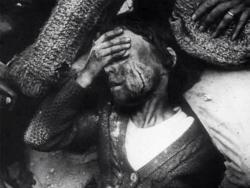
The War Game
1965 -

On The Beach
1959 -
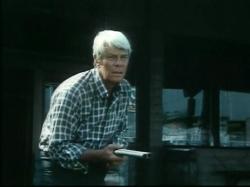
Where Have All the People Gone
1974 -

A Boy and His Dog
1975 -
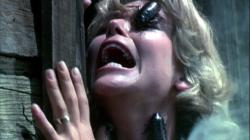
Bug
1975 -
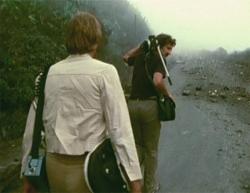
La Soufrière
1977 -

Escape from New York
1981 -

The Road Warrior
1981 -

Le Dernier Combat
1983 -

Night of the Comet
1984 -

Threads
1984 -

The Terminator
1984 -

Def-Con 4
1984 -
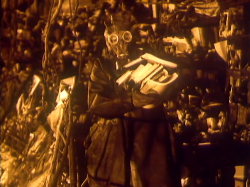
Letters From a Dead Man
1986 -

Miracle Mile
1988 -

Last Night
1988 -

Last Days
2005 -

The Rapture
1991 -

Southland Tales
2006 -

Idiocracy
2006 -

The Happening
2008 -

The Road
2009 -

Cosmopolis
2012
We don’t do comments anymore, but you may contact us here or find us on Twitter or Facebook.



